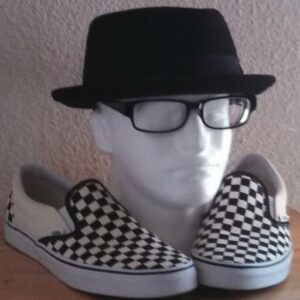An Interview with Warren Andrew Slay, Part 6
Last week I was trying to navigate through an oversized parking garage in downtown Cleveland. It doesn’t matter why I was there; I don’t feel like telling you anyway. There is nothing wrong with a little mystery, is there? As I circled my way down to the exit, I noticed a figure off to my right. The person seemed to be waving to me. That’s when the fun began.
I pulled over into a subcompact-only spot, and the figure approached. I could see that under the trench coat and the fedora that it was a man. He puffed his cigar as he lowered his head to speak through my window.
“Hey, you are the guy who has access to Warren Andrew Slay, right?”
He looked around nervously to see if anyone was watching us as I nodded my head.
“OK, listen. I need you to ask him a few questions for me.”
“Why? What is this about?”
“All you need to know is that I represent a group of interested people. You don’t need to know any more than that.”
“Well, this is all very strange.”
“Brother, you got that right. You don’t want any details. Trust me.”
“I couldn’t be any more confused than I am at this moment. I guess my first question to you is, “Why not ask him yourself?” I don’t believe he is hiding. I don’t think you would have trouble gaining access to him.”
“So you would think.”
“Look, I am in a hurry…”
“Ah, I recommend you listen to me. Certain people would be seriously disappointed if you tried to drive away right now. “
“OK, is that supposed to be some thinly veiled threat?”
“Yes, it certainly is.”
At that point, the mysterious man in the fedora stood tall and flashed a pistol he had holstered about his waist. It was small, bigger than a Derringer, but certainly big enough to make any point he wanted.
“Sigh. All right, what exactly is it that you want?”
“As I said, I represent a consortium of individuals, a gang, if you will. They have tasked me with getting your cooperation in this rather serious matter. Trust me, you don’t need to do much.”
“Is this all legal? I mean, I am not keen on breaking the law. I enjoy my freedom.”
“Oh sir, you have nothing to worry about. Everything is 100% above board.”
“All right then, what do you want?”
The man reached into a pocket, took out a yellow piece of paper, the kind you find in a legal pad, and passed it to me.
“All you have to do is ask him these questions and then post the answers in your blog.”
“That’s all?”
“Simple, right?”
“All right, I’ll look this over and see if he will talk to me. He seems to be losing patience with me.”
“Make sure you get through to him. The consequences are dire if you fail.”
“Another threat?”
“Absolutely.”
With that, the man backed up into the shadows of the concrete. I didn’t bother looking at the piece of paper he handed me; I just wanted to get out of there. When I got home, I talked to Warren Andrew Slay. The transcript appears below. It was, of course, lightly edited for clarity.
RTNM: Thank you for agreeing to this. I know the circumstances are strange, but I don’t feel the need to apologize. I am the victim here.
WAS: Good grief. Poor you. Do you need need a drink? Perhaps I could call in a masseuse to give you a relaxing rub down. I am apprehensive about you. You look a little more pale than usual. Do you have a primary care physician?
RTNM: I see someone, yes. Can we just get on with this? I will be much happier when I have asked you these questions, and you have tried your best to answer them.
WAS: OK, shoot.
RTNM: The note I received stated that I must read these questions verbatim and in a specific order. So, here we go. Question The First. Are you a Platonist?
WAS: You have got to be kidding me. Do you even know what that question means? I can’t believe this nonsense.
RTNM: I didn’t have time to research these questions. The note strongly suggested I needed to ask you these questions as soon as possible.
WAS: Have you thought about retirement? Perhaps your cognitive decline is accelerating. No harm in that; it is just part of being human.
RTNM: Would you please answer the question.
WAS: When I woke up this morning, I tried to figure out a scenario that would allow me to stay there. My intuition told me that getting out of bed today was a bad idea. Unfortunately, there was nothing to be done about it. I couldn’t think of a good reason to get up, but I thought of many reasons not to stay. And here we are.
RTNM: Fascinating. Would you please answer the question? The man at the parking garage flashed a gun while talking to me. Trust me, I am more confused than you are.
WAS: I am not confused at all. Thank you for insulting me. I would have thought that you would have learned to think before speaking at this point in your life. You do want something from me, right? It is pretty much standard practice that insulting a person whose help you need is bad form. That’s some real hillbilly nonsense. And I know what I am talking about, my mom was a coal miner’s daughter. That hillbilly blood runs deep through my veins.
RTNM: Sorry, I truly am. Could you get to the question, please?
WAS: Sure, I would be happy to answer if I knew precisely what you mean by a Platonist.
RTNM: All I have is what is on the paper. No other information was offered.
WAS: All right then. Against my better judgment, I will answer the question exactly how I want to. If you mean to ask me if I am a Mathematical Platonist, your answer is an unqualified yes. I most certainly identify with that camp.
RTNM: Question The Second. Can you elaborate on your answer?
WAS: It comes down to a simple question: Are mathematical truths invented or discovered? The Mathematical Platonists, of which I am proud to claim membership, believe that mathematical truths exist outside the mind of human beings. The Pythagorean Theorem was as valid before it was discovered as it is after it was revealed. If humans never evolved into existence, the Mathematical Truth of The Pythagorean Theorem would still hold for a plane surface.
RTNM: So, if a tree falls in the woods and no one is around to hear it, it still makes a sound?
WAS: Is that one of the questions on the paper?
RTNM: No. That was just me being clever.
WAS: Try harder. Please.
RTNM” Question The Third. Please tell us more about your position.
WAS: As for objects, the five platonic solids have always existed. Just because the Neanderthals never contemplated them, at least as far as we know, doesn’t mean that the idea of them wasn’t written in the fabric of the universe, or universes if you are so inclined.
RTNM: Didn’t you once tell me something about Neanderthals and material culture?
WAS: Is that on the list?
RTNM: Sigh…
WAS: I had a professor once claim that the Neanderthals might have been great singers. They might have done things with harmony that present-day humans can’t even dream of. Of course, they wouldn’t have left behind any evidence of this, so we have no way of knowing. He liked to remind me that this was not probable but certainly was possible.
RTNM: Fascinating. So harmonic utterances aside, you believe that all math is discovered, not invented?
WAS: Good grief, you need to be precise. We have been talking about math that leads to Mathematical Truths. Mathematical Truth is discovered. Nonsense math is invented every day. There are all sorts of yahoos out there creating flawed ways to trisect an angle or…
RTNM: Or what?
WAS: String Theory appears to be the most enormous waste of brain power in the history of the universe. Perhaps it will one day prove fruitful, but I don’t believe those people have yet contributed anything substantive. They go on and on about the beauty of the mathematics and how the equations are so elegant that they have to point toward Mathematical Truth. I guess I would say that beauty, that elegance, do not equal Truth. Beautiful, yet powerless, equations do not lead us down the path to Truth.
RTNM: You have never been a fan of strings, have you?
WAS: To me, the entire enterprise isn’t even wrong. Peter Woit wrote a fantastic book called “Not Even Wrong.” He also has a blog where he writes about String Theory. I will leave it to him and other like-minded individuals to fight for Truth over beauty. Trust me, no one cares what I think, anyway.
RTNM: Question the Fourth. Where are we on the Mathematical Yardstick?
WAS: Impossible to know. My guess is that we are only a fraction of an inch from zero. Why do you say yardstick? Why not meter stick?
RTNM: Because that is what the paper says.
WAS: Interesting. You are most likely dealing with a band of U.S.-trained hooligans.
RTNM: I hate to bring this up, but what is a Mathematical Yardstick? As I explained earlier, I didn’t have time to prepare. I have no idea what such a thing is.
WAS: Imagine that all the mathematical knowledge there is to know is represented on a yardstick. As we learn more, we move along the line. When we reach the end of the stick, math is essentially solved because there are no more truths to uncover; there is no more math to learn. So, my guess is that we have only a tiny fraction of that total at this point in time.
RTNM: …and some of that math will be invented.
WAS: Yes, some will, but the important stuff will be discovered. It was always there even before we were around to contemplate it.
RTNM: Question The Fifth. Is there anything more fundamental than quarks?
WAS: Why on earth would anyone want my thoughts on such a question? I am not a physicist. The last I checked, I am an archaeologist. In fact, I don’t understand why anyone would want to know what I think about any of this. The questions you are asking me are bizarre.
RTNM: Please, I am simply reading from the paper.
WAS: All right, I think that if we ever discover anything more fundamental than quarks, it will be the pure equations themselves. I believe that the basic fabric of existence is represented by the equations that created the universe and govern all behavior, even ours. Especially ours.
RTNM: You don’t believe we are living in a simulation, do you?
WAS: Well, isn’t that an interesting question. There are lots of smart folks out there that take that scenario seriously. Are we living in a computer simulation? I have no idea, and I don’t see how it changes my life one way or the other. I will say that I love The Matrix. It is one of my favorite movies.
RTNM: That is all for now. I have completed the questions on the list. I would like to ask if you have anything more to say.
WAS: Only that mathematics has been and will continue to be unreasonably effective. Eugene Wigner’s essay on that topic is sublime. The only people who disagree with that viewpoint are those who cannot comprehend the specifics of the math used to solve the problem in question. We all know such people. That is just the way it is. One more thing, let me see that paper…



